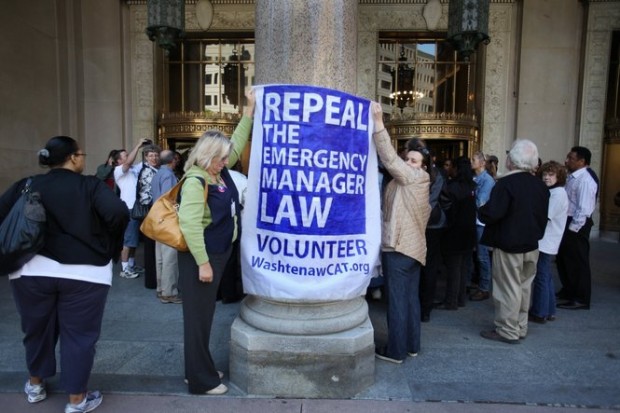This is CCR's weekly "Frontlines of Justice" news round-up, keeping you in the loop about what we've been up to and what's coming soon. Check it out every Monday, your one-stop-shop for CCR opinions, news coverage, reports from court appearances, upcoming events, and more!
Challenging Michigan’s racist and undemocratic Emergency Manager law
Michigan residents protest the emergency manager law.
On Friday, a coalition of Michigan residents, organizations, and civil rights attorneys asked the U.S. Supreme Court to hear a case challenging Michigan’s controversial Emergency Manager Law, Public Act 436 under the Voting Rights Act of 1965. CCR joined Professor Samuel Bagenstos of the University of Michigan Law School, the Sugar Law Center for Economic and Social Justice, the National Lawyers Guild/Michigan-Detroit Chapter, the ACLU Fund of Michigan, along with several Michigan civil rights lawyers in representing this coalition.
Michigan’s law, Public Act 436, is unprecedented, the first such measure enacted anywhere in the United States that abruptly removes all governing power from all elected officials in the selected community and grants it to the governor’s hand-picked emergency manager. It discriminates on the basis of race and deprives hundreds of thousands of Michigan citizens of their fundamental right to vote and to a republican form of government and their freedom of speech and association. The Sixth Circuit Court of Appeals, however, affirmed a lower court decision holding that the Voting Rights Act protects only the physical act of casting a ballot.
The state’s previous Emergency Manager Law, enacted in 2011, was repealed in a statewide voter referendum in 2012. One month later, the lame-duck Michigan legislature enacted the new emergency manager law. The case petitioned to the Supreme Court today, Bellant v. Snyder, follows an earlier case that challenged the 2011 law and was rendered moot when the earlier law was repealed.
“The point of democracy is not for people to merely go through the motions of electing those who sit in a given ‘elected seat,’ but for them to have an equal right to participate in democracy by electing those who actually govern,” said CCR senior staff attorney Darius Charney. “Given that voting rights are under attack nationwide, especially in communities of color, this is a particularly important case for the Court to consider at this moment.”
As CCR executive director Vince Warren said, this case isn’t about abstract constitutional principles – it’s about the very real-world consequences when those principles are violated. In Flint, the emergency manager made the fateful decision to switch to the Flint River for the city’s water supply in order to save money, without the corrosion-control treatment that would have prevented lead from leaching into the pipes. The result was a full-scale public-health disaster. The people of Michigan are literally dying because of this racist, undemocratic law, and we are not going to give up fighting it.
Read more about the case here.
“It is not simply a matter of our right to dissent, it is our moral duty.”
CCR deputy legal director Maria LaHood spoke about recent laws passed by state legislatures to try to suppress Boycott, Divestment, and Sanctions (BDS) at the fourth annual Israel Lobby and American Policy conference, organized by the Institute for Research: Middle Eastern Policy and the American Educational Trust. An excerpt from her talk:
We need to keep making connections between settler colonialism, state violence and racism in this country and in Israel. The struggle for Palestinian liberation is tied to all struggles against oppression. Martin Luther King… described the pivotal Montgomery bus boycott against segregation in the US as a refusal to cooperate with an evil system. All over the world including in the U.S., people are increasingly refusing to be complicit in Israel’s violations of international law and are demanding the same of our government officials. It is not simply a matter of our right to dissent, it is our moral duty.
Cooperation with the occupation, with apartheid is complicity. BDS helped end apartheid in South Africa and it will eventually do the same in Israel. The wave of anti-BDS legislation just shows the power that the movement for Palestinian rights has to expose Israel’s violations of international law and eventually help bring them to an end.
Watch a video of Maria’s entire talk, and read more about CCR’s Palestinian solidarity work.
WATCH: Black Lives Matter, regardless of who’s in the White House
Recently, Bertha Justice Initiative fellow Stephanie Llanes had the opportunity to speak on a panel at the City College of New York, facilitated by the Black studies program. Moderated by Professor Linda Villarosa, Stephanie and Advancement Project attorney Angelo Pinto discussed the various ways that the Movement for Black Lives will exist and resist in the midst of the current administration. Among other things, Stephanie remarked on the importance centering Black voices, and calling out state-sanctioned and state-facilitated violence in all its forms.
Watch a video of the full panel here.


